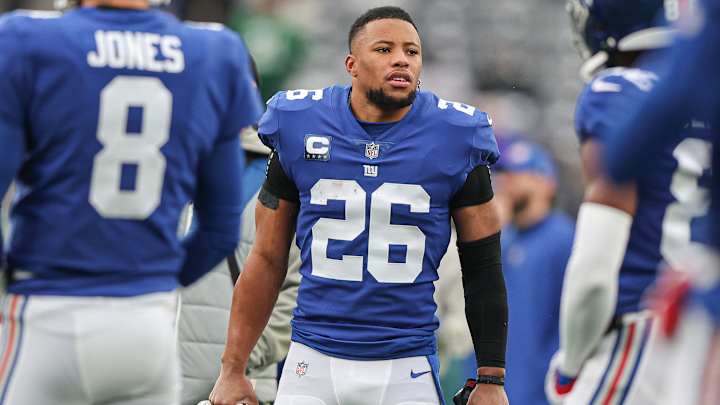The Giants Won the Saquon Barkley Staredown

In this story:
If we are to assign winners and losers of this Saquon Barkley ordeal, obviously you would now pick the Giants as a victor. Barkley, a source confirmed, signed a one-year deal worth $11 million Tuesday morning. This was, essentially, a $2 million up-front payment on the franchise tag salary he was already slated to receive, plus roughly $900,000 in incentive payments. The source also confirmed that the new deal offers no protections for Barkley against being franchise-tagged again in 2024.
The incentive payments are somewhat difficult to reach and, as first reported by The Record, require Barkley to rush for more than 1,300 yards, make the playoffs, catch 65 balls and score 11 touchdowns. This is, of course, the kind of workload a 26-year-old running back with an injury history and a high usage rate already would incur and make him less desirable on the open market the following year. But all indications are that Barkley wanted to report to camp on time, and his personal financial goals could be different from yours or mine.
Barkley’s “win” was to get the Giants to massage the finances of a standard franchise-tag payout and give him the chance to earn slightly more, even if reaching all of those incentives seems unlikely (the Giants’ schedule, for one, is quite difficult). You’d have to go back almost two decades to find a team willing to draw up new paperwork at the last minute on a franchise-tag negotiation like this and present its player with some other options.
Watch the Giants with fuboTV. Start your free trial today.
Ultimately, we should interpret this as a show of good faith, because the sensible course of action was to do nothing. I’ve advocated for friendlier franchise-tag negotiations in the past, but without any recourse—some mass running back strike—there was no reason for the team to worry. As callous as the situation is, Barkley was ensnared in one of the NFL’s effective market-depressing tools, and the franchise tag continues to survive CBA's negotiated by the players' union.
The fact that this agreement represented real benevolence on the Giants’ part shouldn’t say anything bad about the Giants. Again, they could have just ignored Barkley’s calls and allowed him to reach a personal and financial breaking point. But it does underscore just how absurdly mismatched the position is at the negotiating table. If the “win” requires the attainment of exhausting, career-truncating statistics, running backs are no closer to getting off their financial hamster wheel than they were a day ago, when a group of them reportedly appeared on a Zoom call to address the monetary attack on the position.
It’s just as unfair to paint the Giants (or any team in the same position) as villainous as it is to expect Barkley to carry the load for the position and crusade for higher wages, which we also need to remember. We have seen the result of a running back individually rejecting the franchise tag. Barkley, who is a commercially viable entity with plenty at stake on the endorsement front, probably stood to lose more by emulating Le’Veon Bell and skipping a season than simply playing under his current circumstances. We are seven years away from the expiration of the current collective bargaining agreement. In that time, running backs, along with tight ends, will continue to represent the biggest market inefficiency in the sport when it comes to total output and value versus top-end earning potential (both contribute to the success of the passing and running game integrally, especially for true three-down backs like Barkley).
Whether or not the Giants and Barkley intended to set an example, it’s not hard to imagine other teams in similar positions following suit. The Chargers and Austin Ekeler arrived at a similar conclusion a few weeks ago, when they added almost $2 million in possible incentives after Ekeler asked for permission to seek a trade. Perhaps the Raiders will do the same with Josh Jacobs.
It is not a “win,” but, at this point, players at the position as a whole might have to redefine their expectations of what a win looks like. Anything that could be reasonably classified as “more” is better than nothing at all.

Conor Orr is a senior writer for Sports Illustrated, where he covers the NFL and cohosts the MMQB Podcast. Orr has been covering the NFL for more than a decade and is a member of the Pro Football Writers of America. His work has been published in The Best American Sports Writing book series and he previously worked for The Newark Star-Ledger and NFL Media. Orr is an avid runner and youth sports coach who lives in New Jersey with his wife, two children and a loving terrier named Ernie.
Follow ConorOrr